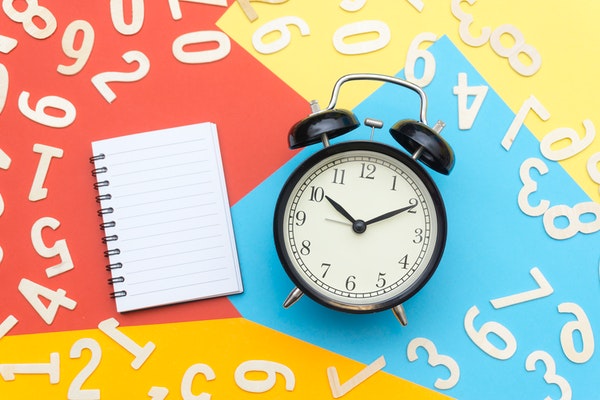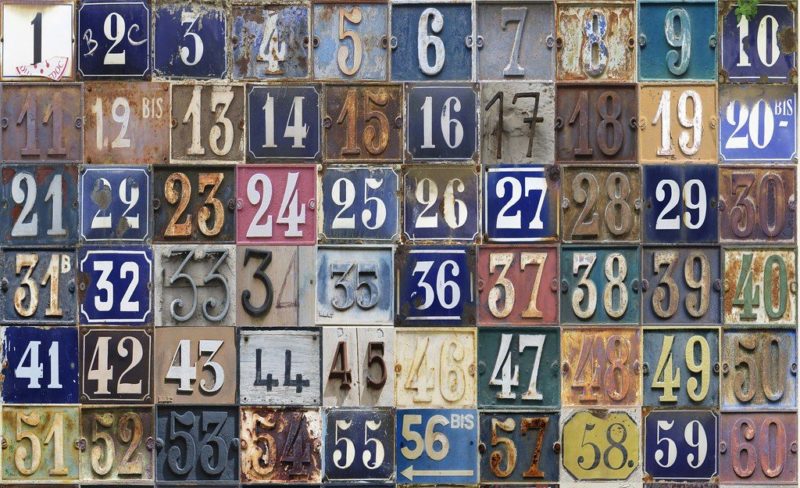How to Start Counting in French
Numbers are a huge part of everyday life. So, they’re crucial to know if you’re learning French. You need to master counting in French to reach fluency. Luckily, you can learn it quite quickly. By the end of this post, you’ll know everything there is about counting in French. Learn everything about French numbers, even over 1-20.
When will you need to count in French?
The short answer is most of the time. But seriously, numbers are a very integral part of our conversations. Whether you are grocery shopping or telling the time, the skill of counting is crucial to have in your vocabulary.
Traveling
When it comes to travel, numbers will be one of the first things you should consider learning in French. There’s plenty of numbers in addresses or navigating with directions. Whether you’re taking a bus or a plane, you’ll need to know the schedule and timetable, which are, of course, numbers. And we haven’t even mentioned the Paris Metro yet. You’ll need to know French numbers if you want to navigate the various metro lines.
Shopping
Imagine being in Paris, and on the way to your apartment you have to stop by the market to buy some items for dinner. Could you ask for the price of a baguette? Would you understand the cost? Could you ask for a dozen eggs? Understanding these things will be important to make informed decisions with your money. Knowing larger numbers is key because some can be confused with each other, and if you’re not careful, you may end up overpaying.
Dates
When meeting with someone or making an appointment, it’s important that you know exactly when to honor those commitments. Learning numbers will be crucial in discussing dates. Remembering birthdays, anniversaries and other special days in French will do your French friendships wonders.

Telling the Time
Of course, telling time in French is another important part of French fluency. And you need French numbers to do that. In France, the 24-hour system is more frequently used, but it’s important to understand what time it is, regardless of the way it’s expressed. Knowing the time of day may mean the difference between life and death in some situations. For instance, meeting someone at a certain time in the morning rather than the night.
Age
When you are asked your age in French, it is imperative that you can answer correctly. The reverse is also true. If they told you they were born in mille neuf-cent quatre-vingt-sept, could you figure out that they were 32? As you may already know, age is a sensitive topic to cover, which is why accuracy is important!
Speaking About Yourself
Your French-speaking friend wants to get to know you more. Maybe you want to tell them how many siblings you have? Or how long ago you visited France? Numbers would come in handy in helping you relate that information.
Idioms
There are sayings and idioms in French that sometimes use numbers in their expressions. Here are two examples:
- Jamais deux sans trois (Never 2 without 3) = things always come in threes.
- Chercher midi à quatorze heures (Look for noon at 2 pm) = to make things complicated.
French Numbers 1-20
Learning the first 20 numbers in French is crucial because they will re-emerge in larger numbers. Be sure to check the pronunciations so that you learn to say them properly.
Number |
French number |
1 |
un |
2 |
deux |
3 |
trois |
4 |
quatre |
5 |
cinq |
6 |
six |
7 |
sept |
8 |
huit |
9 |
neuf |
10 |
dix |
11 |
onze |
12 |
douze |
13 |
treize |
14 |
quatorze |
15 |
quinze |
16 |
seize |
17 |
dix-sept |
18 |
dix-huit |
19 |
dix-neuf |
20 |
vingt |
Here’s a great video to hear how you count in French from 1 to 20:
Counting From 21 to 69 in French
Between numbers 21-69, the logic of counting in French changes a little bit. Luckily, you only need to learn four new numbers for this section: 30, 40, 50, and 60. You will find that 21, 31, 41, 51 and 61 all begin with a number that is a multiple of 10, followed by “et” (and), then the number “un” (one). For example, 21 is “vingt et un”. The rest of the numbers in this group are connected with a hyphen.
Number |
French number |
20 |
vingt |
21 |
vingt et un |
22 |
vingt-deux |
29 |
vingt-neuf |
30 |
trente |
31 |
trente et un |
40 |
quarante |
50 |
cinquante |
60 |
soixant |
If you’d like to hear the pronunciation of these French numbers, this video is a great resource:
Counting From 70 to 99 in French
Between 70-99, things get tricky. Counting in French has a different logic in this section than English. Fortunately, they incorporate numbers that you already know. Every part of the number is connected by a hyphen in this section.
There’s no special word for 70. Instead, it’s soixante-dix (sixty-ten). The numbers 11-19 are added to soixante to become 71-79.
The numerical system in Gaul was based on the number 20 instead of 10. Numbers like 40 and 60 respectively used to be deux-vingt (2 times 20) and trois-vingt (3 times 20). By now, most of the numbers have been renamed. However, 80 still follows the same logic. 80 in French is “quatre-vingts” (four twenties). You may notice an extra “s” at the end of quatre-vingts that wasn’t there for a normal 20. This “s” is only there for 80, and it disappears at 81 (quatre-vingt-et-un).
Just like 70, there’s no separate word for 90. It’s quatre-vingt-dix (four-twenty-ten). And 91-99, the logic remains the same. Add 11-19 to 80.
Number |
French number |
70 |
soixante-dix |
71 |
soixante-onze |
75 |
soixante-quinze |
79 |
soixante-dix-neuf |
80 |
quatre-vingts |
81 |
quatre-vingt-et-un |
87 |
quatre-vingt-sept |
90 |
quatre-vingt-dix |
91 |
quatre-vingt-onze |
97 |
quatre-vingt-dix-sept |
If you’re confused by this, don’t worry. This video can shed some light on this section of counting in French, and give you pronunciation tips:
Counting from 100 and above in French
Numbers in the hundreds and thousands are pretty straightforward. To say numbers in the hundreds and thousands, simply use the numbers you have already learned until now, followed by “cent” for 100, and “mille” for 1000.
Note: Although “and” follows the word “hundred” in English, this is not the case in French. This rule also applies to the thousands. There’s a space between hundred, not a hyphen.
Number |
French Number |
100 |
cent |
101 |
Cent un |
192 |
cent quatre-vingt-douze |
200 |
deux cents |
212 |
deux cent douze |
Notice that there’s an “s” after deux cents. This is only there at round hundreds. But, once you add more numbers, such as 212, the “s” disappears.
Number |
French Number |
300 |
trois cents |
400 |
quatre cents |
500 |
cinq cents |
600 |
six cents |
700 |
sept cents |
800 |
huit cents |
900 |
neuf cents |
1000 |
mille |
1001 |
mille un |
2000 |
deux mille |
3000 |
trois mille |
One million |
un million |
French Ordinal Numbers

Counting in French is an extremely useful skill. But you should also know how ordinal numbers work in French. These are the numbers you use to describe the position in a list. In English, these are numbers like “first”, “second”, “third”, and so on. In French, you build your vocabulary of ordinal numbers on the usual number vocabulary:
English |
French ordinal number |
First |
premier/première |
Second |
deuxième |
Third |
troisième |
Fourth |
quatrième |
Fifth |
cinquième |
Sixth |
sixième |
Seventh |
septième |
Eighth |
huitième |
Ninth |
neuvième |
Tenth |
dixième |
11th |
onzeième |
12th |
douzième |
13th |
treizième |
14th |
quatorzième |
15th |
quinzième |
16th |
seizième |
17th |
dix-septième |
18th |
dix-huitième |
19th |
dix-neuvième |
20th |
vingtième |
To form other ordinal numbers, you simply add the ending of -ième to the regular cardinal numbers. This sometimes means that the final “e” at the end of the cardinal number disappears.
Using French Ordinal Numbers
It’s important to know when to use ordinal numbers in French. Unlike in English, dates and names of monarchs are written with cardinal numbers. The only exception to this is “premier/première” (first). For instance, le premier mai vs. le douze octobre.
In English, we shorten ordinal numbers by putting “th” behind the numerals (except for 1st, 2nd, and 3rd of course). In French, ordinal numbers can be written out by putting a superscript e next to the number: 4e
Useful Phrases for Counting in French
Below are some phrases that will prove helpful when asking questions and giving answers in some scenarios where numbers are involved.
Telling Time in French
- À quelle heure arrive le train ? Il arrive à huit heures. / At what time does the train arrive? It arrives at eight.
How Much in French
- Combien d’enfants as-tu ? J’ai deux filles. / How many children do you have? I have two daughters.
- Combien coûte la chemise ? Elle coûte trente euros. / How much does the shirt cost? It costs thirty euros.

Age and Birthdays in French
- Quel âge as-tu? J’ai vingt-neuf ans. / How old are you? I am twenty-nine years old.
- Tu es né(e) en quelle année ? Je suis né(e) en 1985 (mille neuf cent quatre-vingt-cinq). / In which year were you born? I was born in 1985.
- C’est quand ton anniversaire? Mon anniversaire c’est le 5 mai. / When is your birthday? My birthday is on the 5th of May.
How to Practice Counting in French
Counting in French can be challenging as there are not many methods which concentrate on effectively mastering it. However, with regular practice, this obstacle can be overcome.
- Count in your life: When working with numbers, think of them in French. Numbers are everywhere. Your cellphone, your apartment door, and the proportions of ingredients in a recipe all include numbers. Why not think of them in French? Instead of two cups of water, think “deux tasses d’eau”.
- Watch French documentaries: Documentaries tend to mention a lot of numbers, ranging from historic dates to statistics. Watching documentaries in French will also give you high-frequency words and phrases, so you can enhance your vocabulary rapidly.
- Learn Math in French: Calculations require that you apply your numerical knowledge in finding a mathematical solution. In doing so, your knowledge will soon become second nature. There are excellent resources online for French math students, so taking advantage of these opportunities will be helpful.
Learn French Numbers and More Easily
Knowing how to count in French is crucial to French fluency. You use numbers so often in life, so it’s imperative you become comfortable with French numbers. But, there’s a lot more to the language you need to master to reach French fluency. And OptiLingo can help you with everything.
If you’re tired of learning useless phrases and expressions in French, OptiLingo’s the right app for you. This language learning method is the most useful. You’ll only learn the most common phrases, so you’ll learn exactly how the French locals speak. Build your foreign language confidence from the comfort of your home. Download OptiLingo today, and discover how effective learning a language can be!







